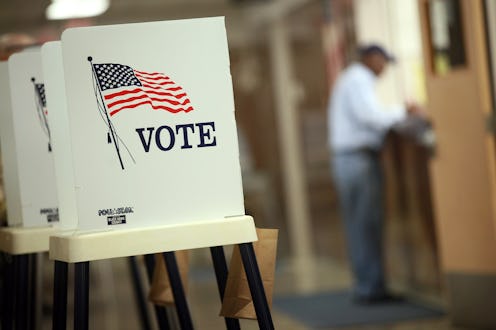News
Politics Just Got Really Personal
New data confirms something you've already noticed at your family holiday gatherings: The U.S. is divided by polarizing political ideologie, according to a Pew Research Center report — not only in voting practice, but in terms of where you live and who your friends are. Talk about politics getting personal. Pew's findings reinforce a long-standing stereotype: Conservatives flock to suburbia, while liberals stick in urban areas. Of people who identified as consistent conservatives, 75 percent would opt to live in an area where "the houses are larger and farther apart, but schools, stores and restaurants are several miles away."
Meanwhile, 77 percent of self-described "consistent liberals" would prefer to live where “the houses are smaller and closer to each other, but schools, stores and restaurants are within walking distance.” These liberals also noted that having art museums and theaters close to home was a priority, while conservatives slated that at the bottom. Oh man, sometimes we really are parodies of ourselves.
Political partisanship is at an all-time high, with liberals and conservatives leaning harder on their side of the aisle than ever before. The study found that people who identify with one party will go as far as actively avoiding members of the other party.
Plus, both Republicans and Democrats crave political homogeneity within friend groups: Among Republicans who have a "very unfavorable" view of the Democratic party, 52 percent say that their close friends share political views. For Democrats with the same views of the Republican party, 41 percent said their friend groups shared their views.
So where does that leave us? Do we turn into creepy, disparate little Hunger Games communities based on our political ideology? Do we come up with secret handshakes based on our political leanings?
Unfortunately, Pew couldn't tell us that. The study, conducted among 10,000 adults nationwide, did dig deep into the activism, voting habits and even the media diets of the two parties. In fact, the study is a veritable tome, but the overarching theme is that we are all self-affirming political snobs that are unwilling to engage outside of our political bunkers. Or something like that.
Still, if you want some more concrete talking points, we dragged out some of the good, bite-sized portions to take away:
- Uniformly liberal and conservative Americans have doubled in the last 20 years, taking it to 21 percent
- 38 percent of Democrats view Republicans in strongly negative terms, compared to 43 percent of Republicans who view Democrats the same way
- The more you hate the other party, the more likely you are to be actively engaged in politics
- Both the left and the right value getting what they want over political compromise
- Only 39 percent of people who hold a "mix" of both liberal and conservative values vote with regularity
